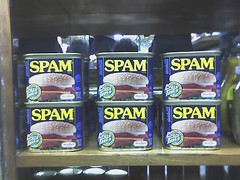When is an email campaign SPAM?
 I wrote about this a while back but I still frequently hear our clients worrying that every email they send out might be violating the CAN-SPAM act. Calm down. The law does not prohibit the sending of unsolicited commercial emails. It does not require people to opt-in to an email list in order for you to communicate with them. What it does do is set some very clear requirements that your unsolicited commercial email must meet. I wrote about this a while back but I still frequently hear our clients worrying that every email they send out might be violating the CAN-SPAM act. Calm down. The law does not prohibit the sending of unsolicited commercial emails. It does not require people to opt-in to an email list in order for you to communicate with them. What it does do is set some very clear requirements that your unsolicited commercial email must meet.
But what the law terms "transactional" or "relational" emails are exempt from the CAN-SPAM law's requirements. That means a follow-up to a transaction (a confirmation, thank you, receipt, etc) does not require an opt-out or a working reply to. Nor does an email sent to someone you already have a commercial relationship with, if it is not a solicitation. In the last few months, one of our clients worried they were spamming if they emailed overdue notices to their members. Another was afraid that they could not send an email touting the launch of a new program to their existing donor list. Both of these are quite legal. The first is a transactional email not covered by the law. The second is an advertisement or solicitation and requires that you meet the opt out and other guidelines. But just because you meet the legal requirements doesn't mean everyone will be happy to be downstream of your communications. As a marketer, that should worry you even when there are no legal issues involved. As Wendy Roth says, Recipients hold email senders, whether political, non-profit or commercial, to a higher standard than what is required by the law.So use some common sense when launching an email campaign. Limit the frequency of your unsolicited messages. Target your communications so they will be genuinely useful and interesting to the recipients. And make sure you meet the CAN-SPAM guidelines when they apply. There is a nice synopsis of the CAN-SPAM act posted at the Federal Trade Commission website. Spam image originally uploaded as: http://www.flickr.com/photos/pe5pe/59398685/ Labels: npmarketing, nptech, spam |




Comments on "When is an email campaign SPAM?"
post a comment